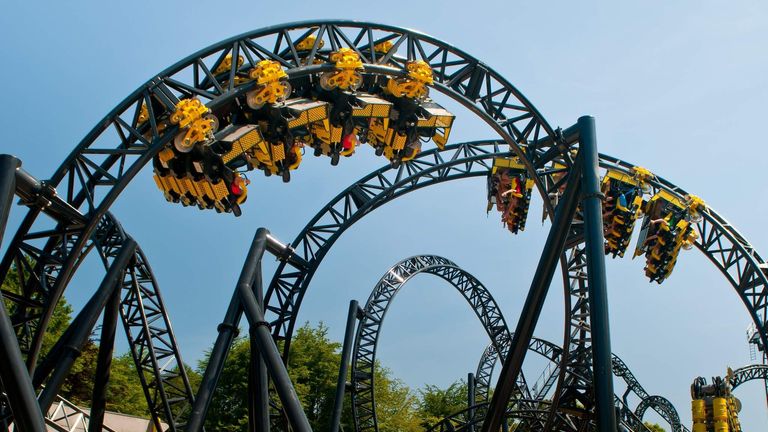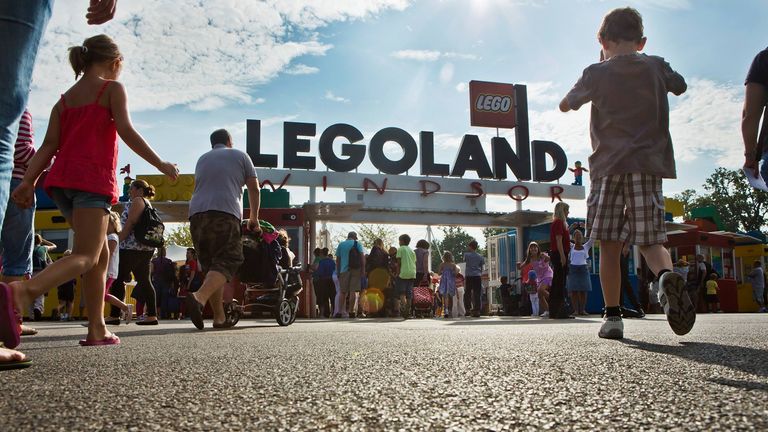Legoland owner Merlin endorses return to Danish family fund
Theme park giant Merlin is recommending a £5.9bn takeover as recent challenges suggest going private could be more favourable.
Friday 28 June 2019 18:45, UK
It has been obvious to anyone who has spoken to Nick Varney, during the past 18 months or so, that the chief executive of Merlin Entertainments has been deeply frustrated at his company's share price.
So what, you may say.
Lots of chief executives grumble about their company's share price, hardly surprisingly, when such a big slug of their pay depends on their total shareholder return - a component of which is share price performance.
The difference is that few chief executives know their business quite as intimately as Mr Varney knows Merlin or have quite the emotional attachment to their business as he does to Merlin.
It is now more than 20 years since, in January 1999, he led a £47m management buy-out of the old Sea Life and Dungeon visitor attractions from the old Vardon Group backed by the private equity firm Apax Partners.
He went on to steer the business through two more changes of ownership, the latter of which in 2005 saw Merlin acquired by Blackstone, the US private equity giant.
By now, Mr Varney had become convinced that there was an opportunity for Merlin to become the world's biggest visitor attraction company, persuading Blackstone to back him as he bulked up the business with acquisitions such as a deal to own and run four Legoland theme parks and, in March 2007, the purchase of the Tussauds Group from media firm Pearson.
That deal made Merlin Europe's largest visitor attraction company and second worldwide only to Disney - which he has been dreaming of overhauling for the best part of a decade.
He told Dominic Walsh of The Times in March 2011: "One day, we'd like to catch the Mouse. The way we look at it is this - we love the business, we're passionate about it, so why wouldn't we want to be number one?
"How we act day-to-day is not predicated on catching Disney but on growing the business profitably and in a focused and strategic way.
"But internally it's a nice call to arms for the team."
It seemed quite logical that, eventually, Merlin would float on the London Stock Exchange.
It came to market in November 2013, valued at £3.2bn, or £4.2bn once its debt was included.
Shortly afterwards, Mr Varney was announcing ambitious expansion plans that included a Madame Tussauds in Beijing, the first North American Dungeon in San Francisco and a number of attractions based on the Shrek film series.
The group was also delivering for its new shareholders: during 2014, Merlin's first full year as a listed company, underlying pre-tax profits rose by 11% to £179m. The company was promoted to the FTSE-100 in April 2015.
But the company's fortunes took a dramatic turn for the worse when on 2 June 2015, an accident on the Smiler rollercoaster at Alton Towers injured five customers, two of whom required leg amputations.
Merlin was forced to close Alton Towers for five days and shut rides at other attractions, including Thorpe Park and Chessington World of Adventures.
The accident clipped at least £40m from the company's 2015 profits and Mr Varney said it had been "without doubt" the hardest year in the company's history.
The terror attacks in Paris in late 2015, followed by a series of outrages across France and Belgium in 2016, also led to heightened security concerns across the continent and did damage, in particular, to visitor numbers in the company's big city locations.
That was further exacerbated by the terror attacks at London Bridge and in Manchester in June 2017.
Mr Varney's response was to rethink the company's investment strategy and direct its spending towards projects that would generate a better return over the longer term.
A licensing agreement was struck with Entertainment One, the owners of Peppa Pig, to roll out new attractions worldwide based on the character.
That has been a success.
A deal was also struck to open adventure parks designed by the survival expert Bear Grylls.
By the end of last year, thanks to its own self-help measures, its wider geographic diversification and a decline in the number of terror incidents in Europe, Merlin appeared to be back on track.
Full year pre-tax profits for 2018 came in at £285m, up 5% on 2017, helped by a record 67 million people passing through the doors of the company's attractions.
Unfortunately for Mr Varney, this progress was not being rewarded by the stock market.
The shares had initially recovered after the Alton Towers accident to reach a peak of 537.5p on 2 June 2017.
The following day brought the London Bridge terror attack and, over the subsequent 14 months, the shares came rattling all the way back to a little over £3 each.
They continued to make modest progress, even after the confident results presentation given by Mr Varney in February this year, so it came as little surprise when, in May, the US activist investor ValueAct popped up on the shareholder register and declared a 9.3% shareholding.
It urged the company to consider taking itself private once again.
In a public letter to Merlin's chairman, Sir John Sunderland, ValueAct said: "We have been concerned that Merlin's share price does not reflect the underlying value of the company and may not in the foreseeable future.
"The company's share price is down 2.7% since the 2013 flotation despite a 35.5% increase in earnings per share. Simply put, Merlin has struggled as a public company."
ValueAct made clear it supported Merlin's management team and its strategy of investing for the long term.
But it added: "Given the challenge for public market investors to appropriately value Merlin's business, as well as the need to sustain a vibrant workplace, we believe the company should evaluate a public to private transaction.
"While Merlin obviously thrived as a private company, it may have come public too quickly, with too many investments left to make for a yield-focused market."
It is pretty clear that this view was shared by Kirkbi, the investment vehicle of the Danish Kirk Kristiansen family behind Lego, which already owned 30% of Merlin.
It was no surprise to see it and Blackstone - the pair controlled Merlin from 2005 until its flotation in 2013 - team up to take the business private.
Both have a longer term investment horizon than Merlin's stock market investors.
The third member of the buy-out consortium, the Canada Pension Plan Investment Board, can also take an equally long-term view and already understands the sector through its ownership of assets such as the Parkdean resorts caravan site chain.
The new owners will be quite happy to forego profits in the short term - as, for example, Merlin builds accommodation at its attractions so families can stay there overnight - for stronger growth in the longer term.
The losers will be the wider investing public. They could either buy shares in Merlin directly or via their pensions and savings schemes.
Now, unless those savings are exposed to some funds managed by Blackstone, they will no longer be able to invest.
As with another recent 'take private' deal with the satellite operator Inmarsat, the wider public has lost the chance enjoy partial ownership of a unique collection of assets.
And that is a shame - even if this deal is undoubtedly the right thing for Merlin, the company's growth prospects and its employees.






